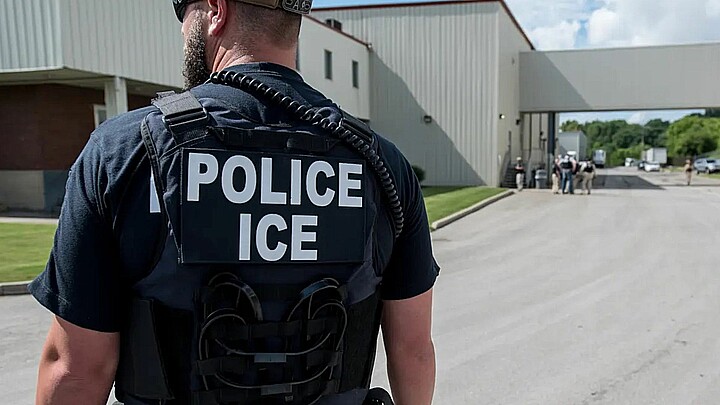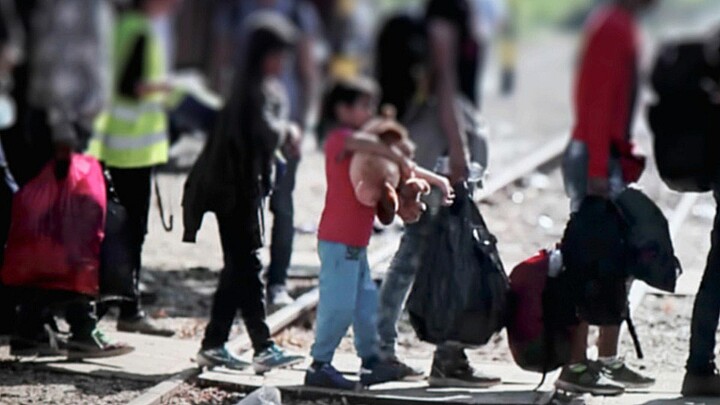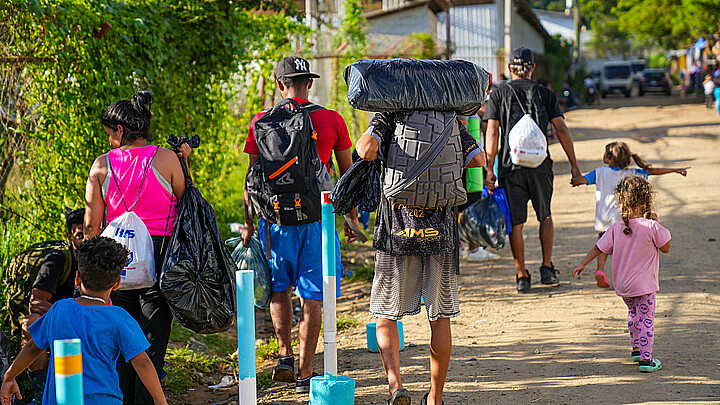Immigration
U.S. expands asylum restrictions at the southern border one month before elections
The new changes come in the middle of a fierce election battle campaign in which migration issues have become one of the central points of the debate between the Democratic candidate, Vice President Kamala Harris and her Republican opponent, former President Donald Trump

October 1, 2024 8:01am
Updated: October 1, 2024 9:42am
The United States government announced this Monday new measures to tighten asylum restrictions at the southern U.S border just over a month before the nationwide elections.
The new changes come in the middle of a fierce election battle campaign in which migration issues have become one of the central points of the debate between the Democratic candidate, Vice President Kamala Harris and her Republican opponent, former President Donald Trump.
In an online statement issued by DHS, Homeland Security Secretary Alejandro Mayorkas said the new restrictions will “strengthen security on the border and deter irregular migration.”
“In June, the Biden-Harris Administration took decisive action to strengthen our nation’s border security and deter irregular migration. That decisive action – the President’s Proclamation and the Departments’ joint interim final rule that implemented it – has been delivering results: illegal crossings at our southern border have dropped by more than 55 percent,” Mayorkas said in the DHS statement.
Mayorkas added that the new restrictions will give “asylum seekers safe and lawful pathways to humanitarian relief that cut out the ruthless smuggling organizations that prey on the vulnerable.”
Earlier this summer, the Biden administration enacted a partial asylum ban, which was expected to last until the end of the year. After its implementation, migrant detentions were reduced to their lowest point in four years.
NEW: Today, the Biden-Harris Administration took additional steps to implement the action announced in June to strengthen border security. @POTUS has issued an updated Proclamation to amend the June Proclamation that temporarily suspended and limited the entry of noncitizens… pic.twitter.com/slM0iICxmt
— Homeland Security (@DHSgov) September 30, 2024
The June policy disqualified most illegal border crossers from applying for asylum and ended a longstanding requirement for federal immigration officers to ask migrants facing deportation if they fear being harmed in their home countries before they are removed from the United States.
The original June restrictions were meant to be temporary and were contingent on a seven-day average of daily unlawful border crossings remaining above 1,500.
Under the recent restrictions however, immigration officials will only be able to overlook that policy if the seven-day average is below 1,500 for 28 straight days.
Officials from the Department of Homeland Security and Justice Department said on Monday the new restrictions were implemented to “ensure that the drop in encounters (of migrants) is a sustained decrease,” not just a “short-term” solution.
The new restrictions will impact most migrants crossing ports of entry at the southern U.S. border.
Migrants who enter the country lawfully by tapping into Biden administration programs are exempted, including the 1,500 processed daily through the federal appointment system.
Those with acute health problems and children who are unaccompanied will also be exempted.
ADN reported in that migrant crossings at the southern border dropped earlier this year after Panamanian officials shut the border down at the Darién Gap natural land bridge that links Central and South America, a critical move that has escaped most U.S. media reports.
Immigration numbers took another downturn after the Biden administration enacted the first set of new asylum limits in June.
This summer from July-September, Custom Border Protection officials documented between 54,000 and 58,000 illegal crossings per month, the lowest levels since September 2020 when President Donald Trump was in office.
Illegal border crossings were about five times that amount at about a quarter of a million in December 2023, which was a record high under President Biden.
“Fewer migrants have been released into the U.S. and the percentage of those deported has increased since the policy was implemented. A senior DHS official said the U.S. has deported or returned more than 121,000 migrants to over 140 countries during this time period,” according to a Sept. 30 news article published by CBS News.
Since the new asylum restrictions went into effect migrant expulsions skyrocketed with authorities now deporting 70% of all adults and families apprehended at the border, a DHS official said.
“Between June 5 and August 31 we have almost tripled the percentage of people expelled (...) after being arrested by the Border Patrol,” the official added.
The recent shift in asylum policy was harshly criticized by human rights organizations, some of which filed lawsuits, accusing the U.S. of endangering the lives of those who need protection.
“This rule is illegal, as we have explained in our pending lawsuit. Today’s announcements do nothing to address the ongoing violations of law,” said ACLU’s Immigrants’ Rights Project Director Omar Jadwat.
“The asylum statute enacted by Congress recognizes that people fleeing danger should not be forced to wait and try to secure an appointment to seek asylum. The government’s abandonment of that principle is already having grave consequences for the people our laws are intended to protect.”
With the current numbers at the border, it is “difficult to imagine” that the new restrictions will be lifted in the near future, WOLA immigration policy expert Adam Isaacson told the EFE Spanish language news service.
“The numbers at the border are still low, but they are not decreasing any further,” he said.
The Democratic administration's decision to modify the restrictions demonstrates a “desperate” attempt to“limit asylum, more than an effort to control the border,” said Refugees International Director for the Americas and Europe Yael Schacher.
Schacher told EFE that the government’s decision to include minors in the count of irregular crossings, shows that they want to “inflate the number of arrests” to limit the entry of migrants and asylum seekers.
The Democratic Party, which seeks to remain in power with Harris’ candidacy, has hardened its stance on migration in recent months, going from defending the asylum system in the U.S. to amplifying restrictions.
The Biden-Harris administration’s immigration policies are a frequent target of criticism from Trump and other Republicans, who often accuse Democrats of creating a “crisis” at the border.
Hundreds of thousands of people have arrived so far this year at the southwestern border in search of better opportunities after fleeing deep social and political crises in countries such as Cuba, Venezuela, Nicaragua and Haiti.
The entire American continent is registering high numbers of movement of people, with more than 21 million displaced, according to data from the Office of the United Nations High Commissioner for Refugees (UNHCR).










